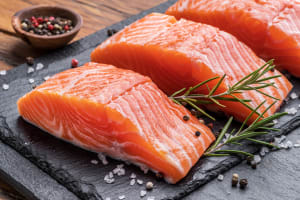For the seventh year in a row, U.S News and World Report rated the Mediterranean diet as the best. Considering that February is American Heart Month and National Self-Check Month, exploring a diet that is both preventative and active in ensuring good health is aptly relevant.
The Mediterranean diet emphasizes such foods as legumes, whole grains, olive oil, fish, fruits and vegetables, nuts, dairy-based fermented foods and meat in moderation. Within these suggested foods, you find protein, vitamins, minerals, fiber, healthy fatty acids and probiotics. There are many kosher products within these categories. All of these foods, with their properties, contribute to strengthening the heart, mind and gut.
One must be mindful though to take small steps when adopting a diet. As an expert in nutrition, with a Ph.D. in neuroscience from Princeton, Dr. Nicole Avena says in Outside Inc., that “it’s imperative to start slow—just like you would approach an ambitious training plan.”
Legumes
Chickpeas, part of the legume family, are laden with penetrating properties directly correlating to heart, brain and gut health. The chickpea is full of protein, fiber, potassium, magnesium, choline and healthy fatty acids. Chickpeas can be enjoyed straight out of the can or in other forms, such as in the form of hummus or gluten-free chickpea pasta where we mentioned OU kosher-certified Banza as an option.
When it comes to the heart, the main concerns are high blood pressure and increased levels of bad cholesterol. High blood pressure means the heart is working too hard to circulate the blood throughout the body. This causes stress on blood vessels. The potassium and magnesium in chickpeas help relax the walls of blood vessels, ensuring smooth blood flow throughout the body. High cholesterol is also a manifestation of the constriction of arteries due to plaque buildup. The fiber found in chickpeas reduces bad cholesterol, as it takes hold of the bad cholesterol and prevents it from returning to the bloodstream. Also, the large intestine ferments fiber into short-chain fatty acids (SCFA) which have been shown to lower bad cholesterol levels.
In discussing brain vitality, one major concern is the onset of degenerative diseases such as Alzheimer’s. One therefore wants to nurture the brain in all its capacity. Chickpeas are full of protein, which is made of amino acids that create neurotransmitters, enabling brain cells to communicate with one another. Choline, which is found in the chickpea, is an essential nutrient that helps the brain regulate memory and muscle movement. Another mineral in the chickpea is magnesium that has been shown to reduce dementia and improve cognitive brain function. The chickpea is also a low glycemic food which means that it slowly releases sugar into the bloodstream, enabling a proportionate amount of energy to be sent to the brain.
The gut consists of the stomach, large intestine and small intestine. It is also known as the gastrologic tract and is where trillions of bacteria exist to form the gut microbiota. Famously termed the gut-brain axis (GBA), there is a direct correlation between the brain and gut microbiota. The gut and brain are connected by the vagus nerve. This means that the physical health of the gut directly affects the mood and cognition of the brain and in the other direction the brain gives instructions to the gut. Therefore, maintaining a healthy gut is of utmost importance not just for digestion but for brain vibrancy. The fiber in the chickpea is a key to enable robust gut health. It fortifies the gut lining and enables regular bowel movements.
Whenever discussing secretion of waste from the body, it’s crucial to note the importance of water intake. The proper amount of hydration will help offset problems with the colon, whose job it is to absorb the water of outgoing waste. If the waste stays to long in the colon then all of the water becomes fully absorbed and the dry stool is now more difficult to excrete. Water intake will compensate for this absorption and keep the stool moist that so that it can have an easy and non-stressed exit, thus protecting the gastrointestinal tract.
Whole Grains
Whole grains are comprised of complex carbohydrates. They offer health benefits for the heart, brain and gut. Starting your day with a bowl of OU kosher-certified Raisin Bran can provide you with the necessary dose of whole grains needed. General Mills also has a nice selection of cereals, one being Oatmeal Crisp that is full of whole grains.
Because they are complex carbohydrates, they break down much slower in the body. This prevents a spike in blood sugar which has positive effects on blood pressure and overall cardiovascular health. As has been discussed above, high fiber content helps to lower bad cholesterol levels by binding to the cholesterol and preventing it from entering the bloodstream.
The brain benefits greatly from whole grains. Due to their complex carbohydrate status, sugar, namely energy, is released slowly into the bloodstream. Just like the chickpea, it is a low glycemic food and therefore releases sugar at a slow pace into the bloodstream. This gives continuous energy to the brain to function optimally throughout the day.
The gut runs smoother based on whole grain intake. The fiber helps to remove waste from the body in steady fashion.
Olive Oil
When discussing olive oils, the purest olive oil to use would be extra virgin olive oil. OU kosher-certified Covolita, a company that began in Italy, has a variety of offerings in this area. Extra virgin olive oil is comprised of peak properties to protect and restore the heart, brain and gut.
In regard to the heart, it is rich in monosaturated fats, which have the effect of removing bad cholesterol from the arteries and serve as less dense units that would otherwise cause artery obstructions. In relation to the brain, extra virgin olive oil is full of polyphenols that are strong antioxidants. Neuroscience News reported that, “Consuming more than half a tablespoon of olive oil per day led to a 28% lower risk of dying from dementia.” For the gut, the monosaturated quality of extra virgin olive oil helps digestion as well, as it facilities a smooth flow of the food through the intestines. The polyphenols also stimulate the production of new healthy bacteria and their preservation.
The Quintessence of the Mediterranean Diet
The core of the Mediterranean diet is fish consumption. In the Mediterranean countries, fish, especially salmon, was an essential component of meals. If kosher regulations are followed, fresh salmon can be purchased in supermarkets. By watching Part One and Part Two of a presentation made in regard to salmon by OU rabbinical coordinator and fish expert, Rabbi Chaim Goldberg, you will know how to proceed.
From a health perspective, fish contains omega-3 fatty acids which offer many health benefits for the heart, brain and gut. For the heart, these fatty acids lower bad cholesterol and raise good cholesterol. In regard to the brain, omega-3 fatty acids actually make up part of the brain. Consumption of these fatty acids enhance neurotransmitter function and general cognition. In relation to the gut, omega-3 fatty acids have been shown to grow good bacteria for the gut.
Of course, fruits and vegetables are trademarks of the Mediterranean diet. As we mentioned in a recent article on flavors, it must be confirmed in regard to raw fruits and vegetables that there are no bug infestation issues or concerns relating to Shemitah (produce grown in the seventh year).
Plant-based eating has become a mainstay worldwide. Fruits and vegetables have major health benefits for the brain, heart and gut. In relation to the heart, they are full of vitamins that help reduce plaque from the arteries. In relation to the brain, fruits and vegetables are filled with antioxidants that are anti-inflammatory, which can prevent the onset of degenerative brain diseases. The gut benefits greatly from the consumption of fruits and vegetables, which are full of fiber. Fiber serves to remove any unnecessary waste from the body to ensure a good digestive system. This in turn ensures good brain function based on the gut-brain axis.
Recipes and Snacking
Some OU Kosher recipes within the Mediterranean diet include Baked Salmon with Mushroom Stuffing, Cumin-Scented Chickpeas and Rainbow Fruit Salad.
One idea for snacking is nuts. OU kosher-certified Planters has many selections. One choice could be Deluxe Cashews, Almonds & Pecans. Nuts are packed with antioxidants, omega-3 fatty acids, and fiber, which boosts the heart, brain and gut.
In the dairy arena, fermented foods, such as yogurt, are encouraged as they are full of probiotics which fortify the gut. Meat is also encouraged in moderation as it contains complete proteins. When we probed the flexitarian diet, we analyzed the benefits of portion controlled meat and poultry consumption and highlighted the intricate process of vitamin absorption.
Conclusion
Robert Collier said, “Success is the sum of small efforts – repeated day in and day out.” One can acclimate themselves to the Meditereanean diet in small steps. From a food perspective, the data shows that the Mediterranean diet is the best. This diet is both active and preventative for the heart, brain and gut. Many kosher foods allow for the implementation of this diet with relative ease, and flavor and taste don’t have to be compromised to adopt this healthy living style.







